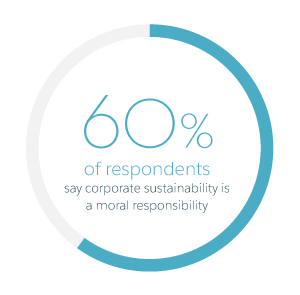
Get your FREE 30-day trial.
Please complete all fields.
Unusual weather patterns, droughts, and natural disasters are on the rise, and people are more aware of climate change than ever before. As the situation becomes increasingly dire, businesses are expected to play a larger role in building a more sustainable future. Corporate sustainability is a business model that strives to have a positive impact on the environment versus the overconsumption of natural resources, harming natural ecosystems, and contributing to climate change.
Salesforce has long been committed to responsible business practices and environmental sustainability, however, we were curious to know what individuals think of their companies’ stance on issues like corporate sustainability, along with other corporate values like equality and philanthropy. So, at Dreamforce ‘18, the Salesforce Research team surveyed 500+ randomly selected attendees and also hosted a focus group to get their perspective on these issues and learn more about how corporate sustainability is implemented at their own companies.

Our survey found that 60% of respondents believe corporate sustainability as a moral imperative. There is a shift in the way individuals are thinking about values like sustainability, brought on by a rapidly changing world and the advent of technologies that make complex concepts more visible and more accessible than ever before. Another recent report from Salesforce Research found that 80% of people think companies have a responsibility to look beyond profit. The resulting pressure from both employees and customers has galvanized businesses to take a stand: over 800 companies have committed to We Mean Business, a coalition catalyzing bold action to accelerate a low-carbon economy. This has led to sustainable business practices becoming a bigger part of the way we work.

Our survey found 72% of respondents said they expect sustainable business practices from their company and 61% expect sustainable business practices from companies they buy from. Employees in the tech industry are especially concerned with corporate sustainability: 79% of employees in the tech industry expect sustainable business practices versus 69% of employees in other industries. This may be that individuals feel more strongly invested in their employer's behaviors and sustainable practices than other companies. Employees are saying they want to know that their work contributes to a better world — and who wouldn’t?
Even though the majority (59%) of attendees surveyed agree that sustainability is important for their company's long-term success it seems as though many companies still weigh sustainability against financial benefit. A director of operations in the manufacturing industry who participated in the focus group said: “We have a fleet of 600 trucks. There's probably zero thought about all the diesel used. If we can get more deliveries in a day, it just makes more financial sense.”
For companies concerned about the financial costs of more environmentally friendly operations, sustainability initiatives can be a worthy investment. Many alternative energy sources, for example, are even cheaper than traditional fossil fuels. Reducing fossil fuel usage is becoming increasingly economically viable as their costs reach parity with renewable sources.
This was a central theme at the Dreamforce ‘18 Climate Summit where Al Gore brought the audience to its feet with his passionate call to join the “sustainability revolution: “The sustainability revolution is the biggest business opportunity — ever. This is a breakout moment...With new business models like pay-as-you-go solar emerging, we’re seeing this revolution accelerate. It’s up to us. This is our home.”
Another key message during the Climate Summit was that everyone has an important role to play in driving positive environmental action. Everything people do, from a direct action like beach clean-ups and recycling drives to the things they buy, has an impact on the fate of the world.

And as individuals learn how to live more sustainably, it increasingly translates into their buying habits, particularly among the younger generations. In a related study, we found that 54% of millennials/Gen Zers are more trusting of a company that works to protect the environment.
Gore said it best: “This is our home.” Sustainability is more than a corporate initiative; it’s an opportunity to pass a healthier, cleaner, more fruitful world to future generations. There is much that needs to be changed, but keeping values like sustainability at the heart of corporate policy is a powerful place to start.
At Salesforce, we consider the environment to be one of our key stakeholders and we believe business is one of the greatest platforms for change. We are committed to doing our part to step up to the urgent challenge of climate change, ensure a just transition to a low carbon economy and provide a healthy future for all. To learn more about sustainability at Salesforce, visit salesforce.com/sustainability.